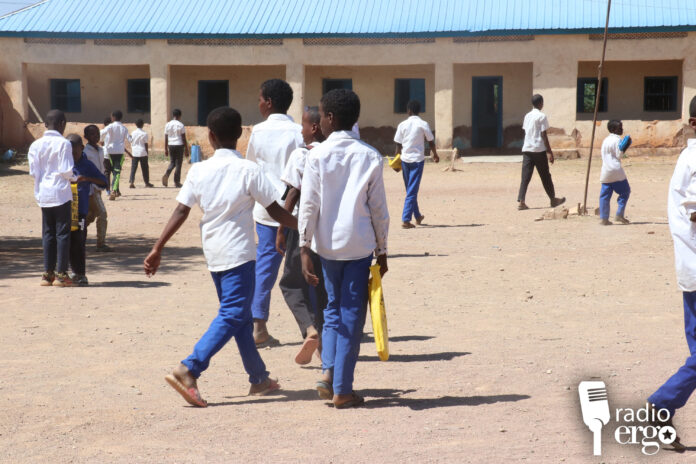
Nooc Abdullahi Ali has been worried sick about her five children ever since they finished middle school in Elbarde, in southern Somalia’s Bakool region.
Her two daughters left last year, and her three sons the year before. Nooc and her husband had struggled to put them through school, but their education journey came to an abrupt end because the district has no high school. “They are just staying at home or in town,” Nooc told Radio Ergo. “If someone stays for a year and their hopes are dashed, their mind moves into another world. They start thinking of migrating, or petty crime, or just hanging in the street. They have nothing to aim for.”
Parents like Nooc say there is a huge need for the district to provide high school opportunities. Those who can afford it send their children to high schools over the border in neighbouring Ethiopia, or to other regions. However, with Nooc running a small shop selling utensils and clothing, and her husband making small money as a livestock broker, their income barely covers the basic needs of the large family. They have three children still in Ugas Khalif primary and middle school. They also take care of four of her absent sister’s school aged children.
“The children always ask why I can’t send them to Kenya, or Mogadishu, or Ethiopia, or somewhere else,” Nooc said. “That is our constant argument, but the best I can do is earn enough money to pay for the food.”
There are 13 schools in Elbarde district, eight primary and five middle schools.
Mohamed Sheikh Hussein, Elbarde district education commissioner, said about 500 students finished middle school this year.
“Some of them were sent to other parts of South West state or elsewhere to high schools, but about 150 did not get any opportunity, which is a serious problem,” he acknowledged.
Jama Abdi Ali, a member of the parents’ committee at Ugas Khalif school said at least 10 boys left on migration journeys to Libya between 2010 and 2018. He believes they would not have taken such a risk if they had had the chance to continue their education. “We can predict the future of the students: some travel overseas, others become street children, while the rest end up chewing khat,” Jama said.
“These students spent eight years in school and were bright and hopeful, but when they are out of school for more than a year, they get demoralised and try anything, especially overseas migration. Parents can try to deter them for a year or so, but they eventually escape.”
Jama fears that his two sons, ages 12 and 14, could be influenced by those who migrated.
“The parents are very depressed, very worried about this. Me, as Jama, I have two boys now in eighth grade, and even if they pass the exams there is no high school for them in Elbarde. So what will I do?” he said.
The foundation stone for a high school has been laid twice, first in November 2018, and again in on 23 December 2019, when the president of South West state visited the district. However, the District Education Board – as well as the population – are still waiting for the authorities to commence construction of the long awaited school.
Source: Radio Ergo


